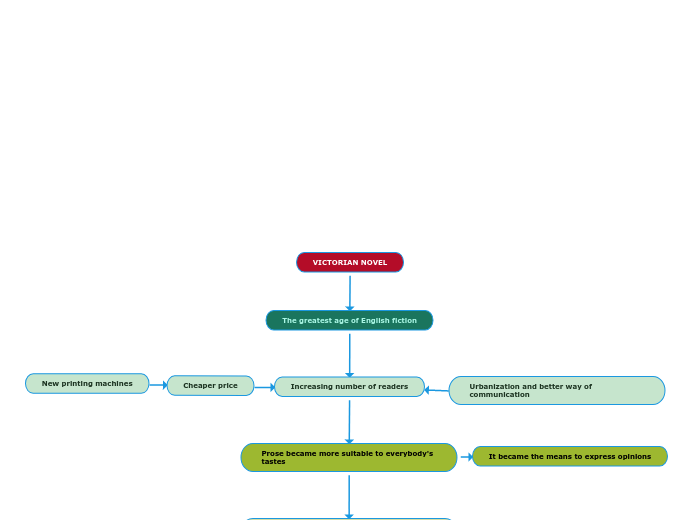VICTORIAN NOVEL
The greatest age of English fiction
Increasing number of readers
Prose became more suitable to everybody's tastes
It became the means to express opinions
Stories were published serially, on newspaper
1820
novels were published as books and were quite expansive
After, books were printed in separate parts in monthly subdivision
This method modified the structure of the novel
Popular appeal to working class
Mass literature
Episodic structure to the plot
Excessive length of some of those stories
The writers had to speed up the rhythm of the narration and find new devices to catch readers
“make them love, make them cry, make them wait”
Recourse to the sensational
A mix of complicated plots
Crimes, victims, punishments, also helped the writer to focus on the social events of his time
CHARLES DICKENS
Personal life
He was born in 1812 in Portsmouth
He went to school and began to read novels by Defoe
In 1823 his father, who worked as a clerk in the navy pay office, was sent to London, and Charles had to move, too
As his father had a lot of debt, he was forced by his creditors into a prison in 1824, leaving his family without any source of income
Charles was thus forced to leave school and start working at Warren's Blacking Warehouse
This factory was dirty and cold, and his mates were rough and violent
Charles felt humiliated and he refered to it in his works
Through a legacy, his family’s fortunes improved, and he was able to go back to school.
He was sent to a school in Hempstead, where he learned not so much and made no friend
At 15 he left school and started working in a court in a Lawyer’s office
This helped giving a background to some of his novels, especially Bleak House
He also learned shorthand and became a journalist in 1830
He married in 1836, to the daughter of a colleague, but he separated in 1858, for he had fallen in love with an actress
In 1836 he began his literary career
He was the first editor of the daily news, and of some periodical
His first novel was “sketches by bars”
A series of journalistic sketches with episodes of everyday life
Then he wrote the Pickwick Papers
He wrote some historical novels like A Tale of Two Cities, in 1859, when Dickens was already an affirmed novelist
he had already written Oliver Twist, Nicholas Nickleby, David Copperfield, Hard Times
Dickens' style
The sequences of events we see in his novels is originated from the serial form, but also from his creativity
Dickens humor is linked with pathos that is also a very important side of his novels
Dickens is a very subtle observer of the Victorian life
The painter of London Life
He could give us a very detailed description of British social and everyday life
Detailed sketch of manners, usages, and clothing of people of his own era
Dickens descriptions can be seen as photographs of his time
Dickens’ characters are divided into good and evil ones
They are usually flat characters, even if sometimes round characters are present
Dickens was not usually interested in the spiritual side of his characters
He used fiction to denounce the evils and vices of his society
He did not advocate for change, even if participating to some protests
He created a great number of plots, sublots and characters
There were different gemre, but the two most recurring were social novels and the novels of manners
